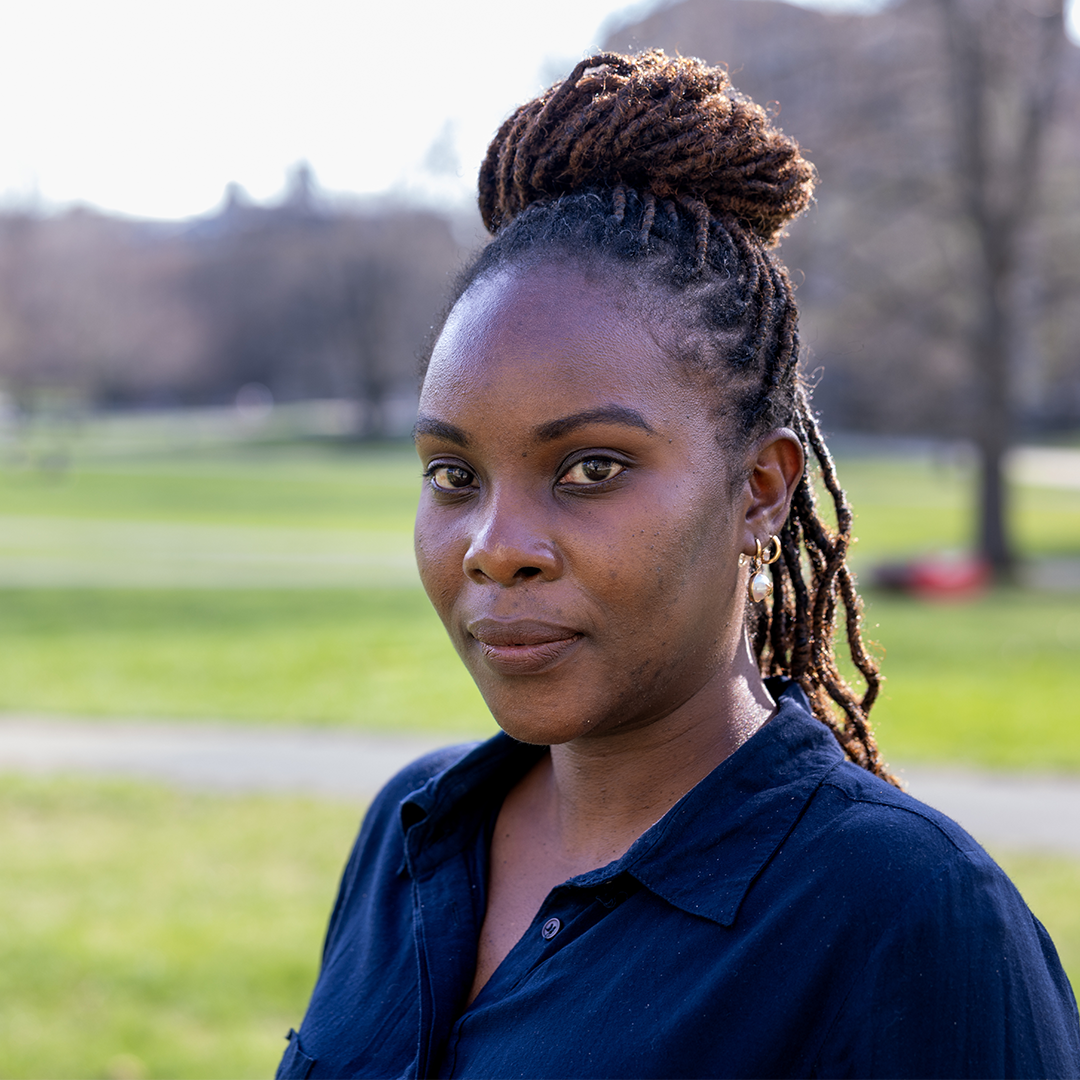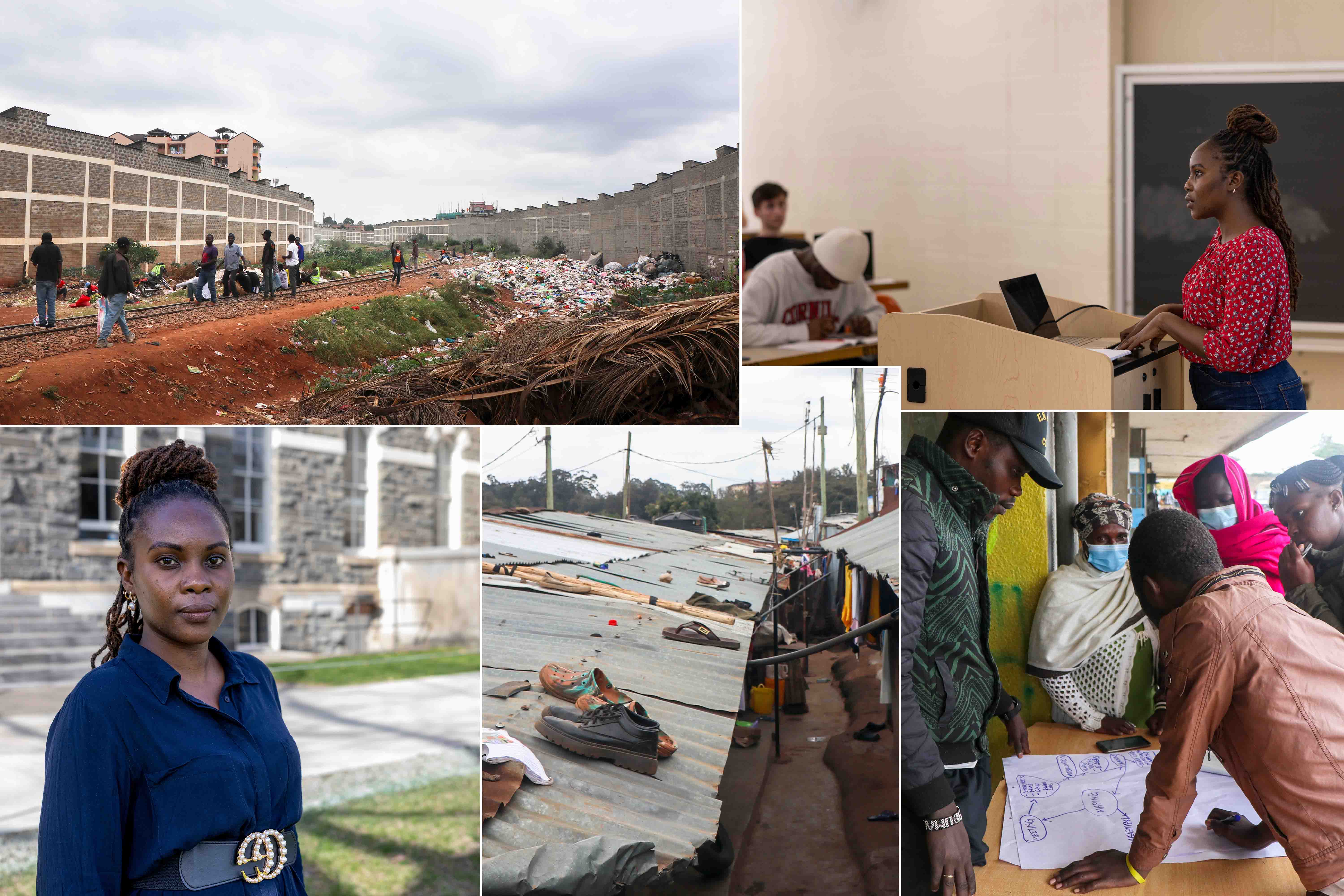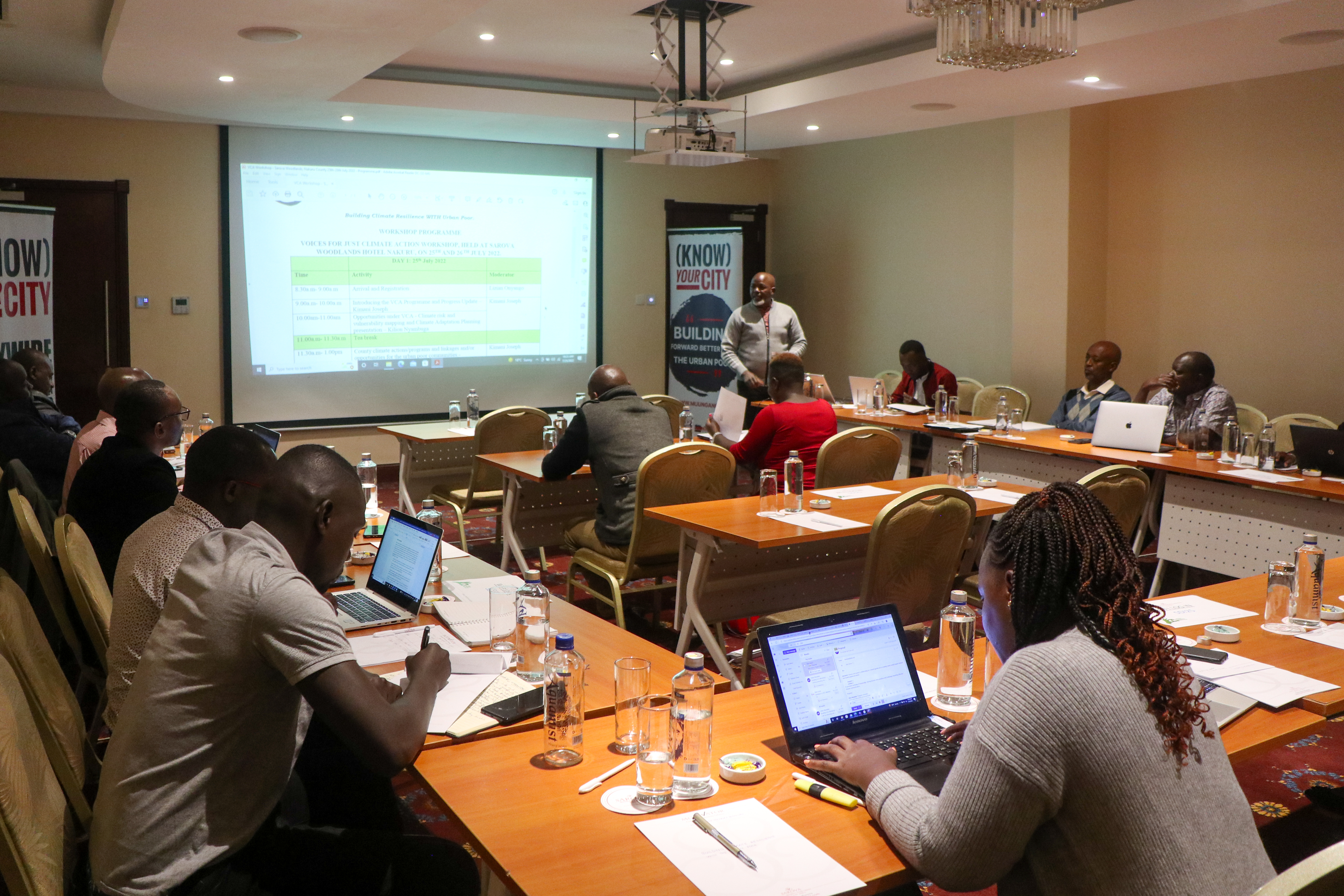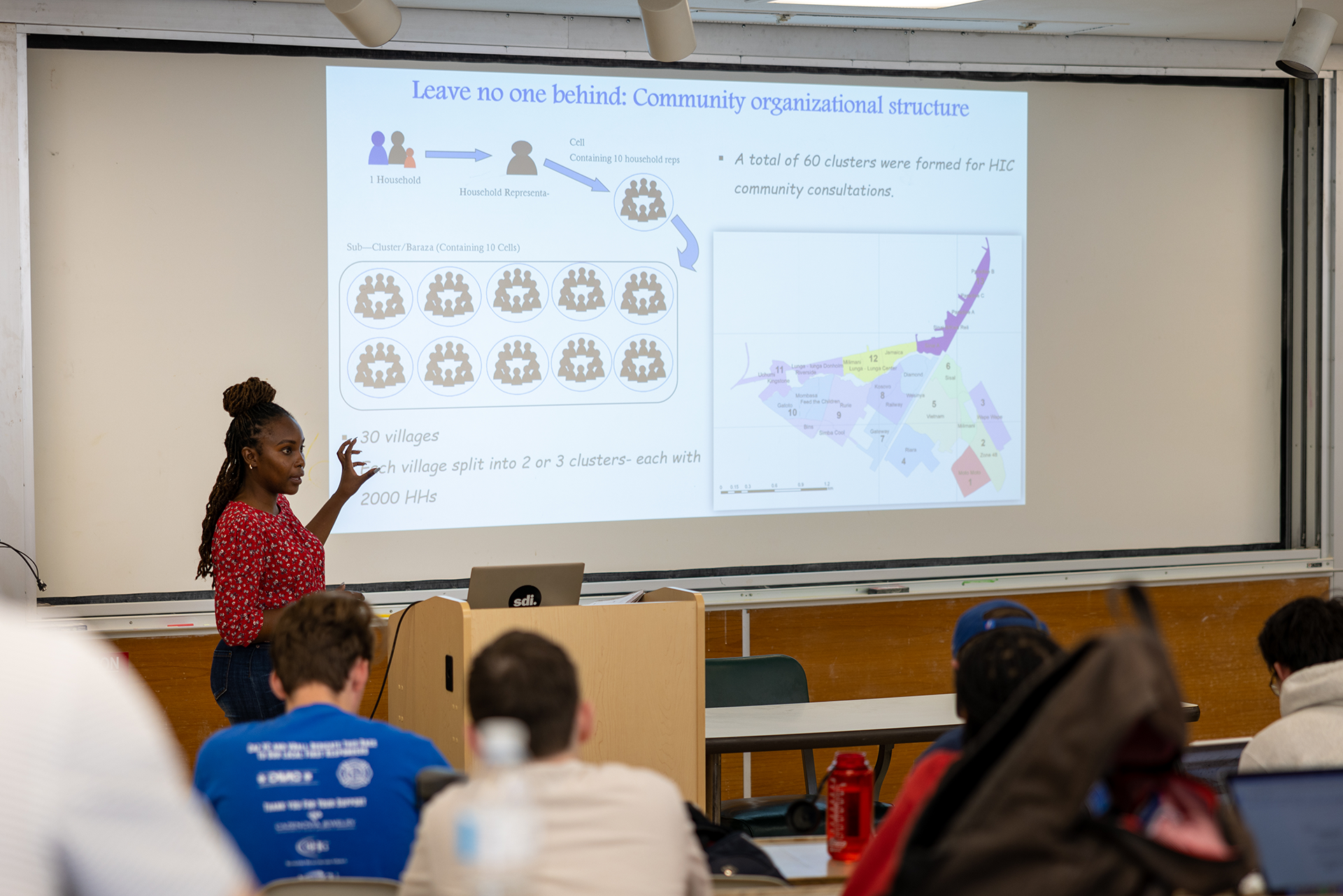
Charity Mumbi Mwangi

Charity Mumbi Mwangi (lower left), programs officer with SDI–Kenya, is in residence at the Center for Cities at Cornell AAP this semester, exchanging ideas with faculty and students.
Worldwide, more than 1 billion people now live in slums and informal urban settlements, with rural residents continuing to arrive at a rapid pace in search of employment opportunities in cities.
"In the Global South, a lot of the urban fabric is produced informally outside of regulatory frameworks," explains City and Regional Planning Professor Victoria A. Beard, Director of the Cornell Mui Ho Center for Cities. "Existing planning and land use frameworks are not capable of, and in some cases not appropriate to, keeping pace with population growth and the expansion of the urban footprint. Local, city-level governments simply don't have the fiscal resources to provide core urban services."

Entry point to the Mathare settlement in Nairobi mainly comprised of temporary wood and corrugated metal structures. photo / Nicholas Wilsey (B.S. URS '25)
Due to these pressures, informal settlement communities the world over face a number of common difficulties, including housing insecurity and inadequate access to core urban infrastructure and services such as electricity, water, and waste management systems. However, Slum Dwellers International (SDI) is supporting dynamic, grassroots change in more than 400 cities across 36 countries in Asia, Africa, and Latin America, working collaboratively to improve the lives of these residents. They are empowering them to collect data themselves (as part of the Know Your City campaign) and to use this data to advocate for the provision of site-specific services and infrastructure. To date, the outcomes of their work include upgraded homes, water and sanitation improvements, better roads and street lighting, healthier communities, and the safeguarded dignity of residents.

Charity Mumbi Mwangi
Charity Mumbi Mwangi, a programs officer with SDI–Kenya (SDI-K) and current visiting scholar in residence at the Center for Cities at Cornell AAP, was initially attracted to the particular challenges of planning work in this setting while an intern with the University of Nairobi–Centre for Urban Research and Innovation, which was collaborating with Muungano wa Wanavijiji, a social movement of slum dwellers in Kenya and one of SDI's many active affiliates.
"I got to see the power of a community that understands what it wants, and I knew instantly that that is what I want to be doing as a planner," Mwangi says, recalling her introduction to work in an informal settlement through a learning studio project in Kitui County. She was impressed by the community involvement, which went far beyond simply ticking the obligatory planning boxes of collecting information and guiding procedures with conventional disciplinary knowledge.
"I was able to work with the local communities collaboratively, as opposed to how I had been taught: that a planner will go into the field and collect all the data. In this case, the communities were being trained and were collecting their own data, and we were just offering oversight. The communities were also spearheading their own focus group discussions. It was quite interesting to see the whole vision in the process, where communities were able to say what they want in their settlement and how they want it done."

Community engagement with participants in the data collection process to identify strengths and areas for improvement. photo / Nicholas Wilsey (B.S. URS '25)
This semester, Mwangi brings her professional experience and passion to AAP, continuing a partnership between two organizations focused on issues of urban climate change mitigation and adaptation, a key Center for Cities initiative.
SDI works with diverse stakeholders, and they continue to build their network across community, governmental, and academic institutions in the belief that it is through these partnerships that the most effective solutions to complex problems and tangible, meaningful results become possible.
That potential excites SDI President Joe Muturi, including the growing relationship between SDI and Cornell. "The Center for Cities partnering with the SDI network will provide opportunities for collaboration between researchers, students, affiliates, and community leaders. This can lead to the development of innovative solutions to complex urban problems that are tailored to the specific needs of the communities." This is especially important at a time when the difficulties many of SDI's networked communities face are further exacerbated by the impact of climate change. Muturi sees an opportunity to help mitigate these challenges in context through their collaborative work that connects communities to institutions. "Communities will have access to this data and technology, and they will help to test and implement them in real situations."
Beard echoes Muturi's experience from her position as director of the Center for Cities. "Academic research on cities, written for publication in scholarly journals, often never leaves the university walls," she explains. "The results of our research will not scale unless we build close relationships and work collaboratively with our outside partners. Working with SDI presents an opportunity for AAP faculty and students to coproduce research with community partners that is applied, timely, sensitive to the local context, and has the potential to contribute to meaningful positive change."

Community stakeholders and municipal leaders gathered at a conference in Nakuru, Kenya, to discuss climate impacts and mitigation strategies in informal settlements. photo / Shhrruti Jain (M.S. AAD '22)
The outcomes of partnerships with academic institutions, both in Kenya and abroad, are already evident. Mwangi cited the impact of such work in the Mukuru Special Planning Area (SPA), where government planning standards proved unworkable. As an alternative, SDI collaborated with Strathmore University, University of California Berkeley, CEPT University, and University of Nairobi to develop alternative planning standards that she says were "just flexible enough" — policies tailor-made for informal settlements. As a result, the government installed a simplified sewer system which followed gravity rather than the roadway, managing to avoid household evictions. They also worked with Nairobi Metropolitan Services to improve roads that adhered to the developed alternative planning width standards, leading to economic growth, eased emergency access, increased public space, and even allowed residents to reduce reliance on motorized transport. "Now we have a walking community because the roads are pedestrian-friendly," Mwangi reports.
It is not surprising that the challenges informal settlements face are inexorably linked to climate change. Perhaps no other communities are hit harder by extreme weather and related hazards such as electrical fires and floods, resulting in loss of property and human life. Houses are washed away during storms, emergency services are unable to navigate narrow roads, and potable water is contaminated by sewage and urban runoff creating public health risks.
Urban poor residents and organizers alike want to see transformation through policy and practice. SDI's approach combines valid data about informal settlement with the lived experience and expertise of settlement residents to produce change in partnership with government, CSOs, academic institutions, and other agencies. For example, SDI-K is running Voices for Just Climate Action (VCA), a five-year program that amplifies some of the most marginalized perspectives on issues of climate change. Through the program, the organization has mapped local climate actors within impoverished areas in Nairobi, Nakuru, and Kisumu counties and conducted risk and vulnerability assessments in order to produce city-wide vulnerability atlases to guide climate action by the government. VCA's effort will also lead the development of city-wide climate adaptation plans, integrating the efforts of all climate action players from grassroots to national levels.

Mwangi delivering a guest lecture to an AAP class. Anson Wigner / AAP
While at AAP, Mwangi is giving several guest lectures in classes, meeting with faculty and students, and planning the next phase of strategic partnership between SDI and the Center for Cities, including the recruitment of Slum Dwellers International Summer Fellows. In her interactions with students, she hopes to "stir them up," she acknowledges with a laugh, inspiring them to let SDI's work inform their approach to data collection, planning processes, and climate issues. "These [informal settlements] are spaces where people deserve the opportunity to attain a decent living — spaces of economic, political, and social potential," she says, inviting knowledge exchange with Cornell planners.
Nicholas Wilsey (B.A. URS '25) and Shhrruti Jain (M.S. AAD '22) took up that work last year as the first SDI Summer Fellows to visit Kenya from Cornell. They experienced life first-hand in settlements such as Mathare, Nakuru, and Kibera — visiting homes, speaking with residents, and observing the impact of community improvements. They also gained a wealth of work experience, consolidating and cleaning immense amounts of collected data, generating high-impact reports, and developing simplified, straightforward questionnaires for local communities around climate vulnerability.

Map of individual structures within Mathare settlement and community facilities. Data was collected via extensive outreach in the community in the form of hand-drawn maps and was then digitized. image / Shhrruti Jain (M.S. AAD '22) and Nicholas Wilsey (B.S. URS '25)
Wilsey recalls being inspired to get involved with SDI Summer Fellowship program after Muturi presented some of the organization's work in settlement upgrading as part of the Global City course he was taking in Ithaca. The real-life experience of working on the ground far exceeded initial expectations, allowing him to apply skills and learn from the organization's initiatives. "SDI offered us the opportunity to deeply engage and influence these initiatives, far beyond the tasks that might traditionally be expected of an 'intern' role. For example, Shhrruti and I were responsible for developing and workshopping climate data collection tools with municipal leaders from across the country that will be used to collect thousands of data points over the coming years."
The staff at SDI similarly appreciated the insight and enthusiasm the students brought to their positions, as well as their willingness to collaborate with others, and generally engage with the community. "Any time they could go to the field, they would come back and say how happy they were," Mwangi says. "They felt they could make change."
Interested in serving as a Slum Dwellers International Summer Fellow in 2023? The application deadline is Friday, April 21, 2023. Learn more.